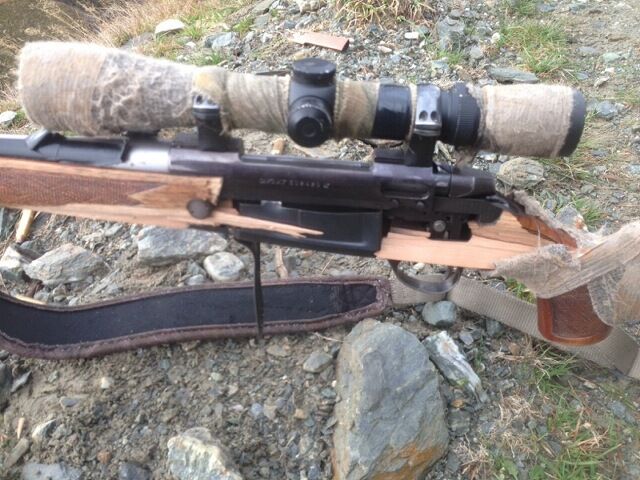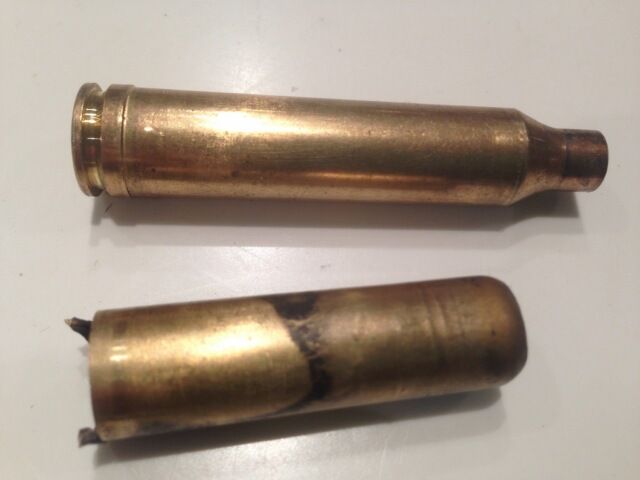

 The Accurate Reloading Forums
The Accurate Reloading Forums  THE ACCURATE RELOADING.COM FORUMS
THE ACCURATE RELOADING.COM FORUMS  Guns, Politics, Gunsmithing & Reloading
Guns, Politics, Gunsmithing & Reloading  Reloading
Reloading  Interesting Occurance
Interesting OccuranceGo  | New  | Find  | Notify  | Tools  | Reply  |  |
| One of Us |
Deleted. | ||
|
| One of Us |
Hi larrys, I have had this happen every now and then. My only explanation is the primer pocket may be oversized. Why I can't say, softer brass in the cartridge base maybe. I tend load on the lower to medium velocity side, so it's not from hotrodding my loads. I have had this happen with all makes of brass, so not just one companys brass. I also think maybe the primer may be undersized. | |||
|
| One of Us |
Larry..do you know what velocity you were getting with those loads? FWIW the nosler manual shows 52.5gr as their max load with the 130gr AB, but I doubt that is the issue. My 6.5-06 doesn't seem to follow the book very well..I messed with IMR4831 for a while and went quite a bit over the listed max and didn't come anywhere near the velocity they listed..and didn't have any pressure issues either. To date I haven't seen gas leakage like you experienced..I have heard of some guys having issues with undersized Win primers.. | |||
|
| One of Us |
Looks like a blown primer to me. You're way over pressure. Back-off a few grains. | |||
|
| one of us |
did you maybe have a .277 bullet mixed in somewhere? I've found .284 bullets mixed in a .277 box. Look exactly a like, and they will fit if the case neck is thin enough.. Remember, forgivness is easier to get than permission. | |||
|
| One of Us |
Old age is a high price to pay for maturity!!! Some never pay and some pay and never reap the reward. Wisdom comes with age! Sometimes age comes alone.. | |||
|
| one of us |
I'd go with weeriverrat1 on this one. My 6.5-06AI gives me pressure indications at 54 grains with the 125 partition, which is only .5 grain above the Nosler book for the regular 6.5-06. In this case, I have found the Nosler info to be pretty good for max, but I concede that every rifle is a rule unto themselves. The other thing that MIGHT have happened is that since you used 30-06 brass to start with, the neck on that particular piece could have been thick. I use 270 and 25-06 for my starting brass. Larry "Peace is that brief glorious moment in history, when everybody stands around reloading" -- Thomas Jefferson | |||
|
| One of Us |
I have been working up a load for this. Even at 54.0 grains I have seen no signs of excess pressure. Bolt opens easily and case extracts as normal. Primers flattened but not cratered. The necks have been turned on these cases to a variation of less than .0015. I did not notice a hard to seat bullets when I loaded them so I feel all bullets were 6.5 mm. Every powder charge is weighed on a RCBS dispenser/scale and then tweeked on a Beam Scale. Only 1 can of powder on the bench when loading. I did check a 20 pcs sample of my RP 30-06 Brass today and found 1 with a larger primer pocket, but I didn't notice a primers seating easy when I primed the cases. | |||
|
| one of us |
Is there any chance this resulted after case forming by way of an unintentional annealing of the base? Wish my memory was better, but years back I read about some factory 5.56 brass that had been reverse annealed, so the case heads were all soft and discolored at base. IIRC, resulted in normal pressure KB or just dropped primers/loose pockets. You won't see the telltale discoloration at base on polished commercial brass. | |||
|
| One of Us |
You sound like an experienced reloader and I do not want to cause offense. Firstly - pressure is a funny thing and pressure spikes can occur from many variables. One minor change like seating depth can cause pressure spikes. Bolt opening easily & extracting easily is NOT a definite sign of safe pressures. It could just be a very smooth action & well polished chamber. Secondly - you say you measured the cases & they were fine. The question is whether you measured the cases BEFORE and after firing to get the expansion???? That is the key. Most factory cases are below spec at the head and you can get unsafe pressures while the fired case still reads within spec if the EXPANSION is high! What is the velocity? I agree with some of the other posts & think you may be using a dangerous hot load. Be safe & have fun.
"When the wind stops....start rowing. When the wind starts, get the sail up quick." | |||
|
| One of Us |
If I may, necking brass down often results in a much thicker neck, as well as lengthening the case. I wrote some articles for PS where I looked for better accuracy with, among other cartridge, making 308 Win out of 30-06 brass. I was surprised to see how much thicker the case necks were. That was my intent, to see if I could make my Hunter Class Benchrest Rifle (started with a factory chamber that had about .007" clearance on a loaded round) to use that as a way to reduce clearance to a meaningful degree. Answer was yes, to a certain degree. Here you are just necking the case down, but did you measure length as well as mike case neck OD after FL sizing the brass? It would not take much of an increase in length to act as a crimp when chambering. Litz writes that that can cause a tremendous increase in chamber pressure in one of his earlier books. From your posts, I would expect you ran the necked down cases thru the standard drill; but it bears repeating about the potential for something like this. | |||
|
| One of Us |
I got the cases as once fired 30-06 cases. I run them thru the 6.5 06 die, trimmed to length, Turned necks for 80 to 90% clean up. Resized again in the 6.5-06 die. Sample rounds are cycled thru the rifle before loading. I suspect these were not all once fired cases as I found one today that my no go gage goes into the primer pocket. | |||
|
| One of Us |
Larry I recently posted pictures of a Sako rifle ruined by a shooter who fired a 308 cartridge in a 7mm Rem Mag chamber. See photos below. Even experienced people can make mistakes. I am not trying to be rude or offensive. Just hoping to help you be safe. Your comments so far tell me that you might have missed a few basic steps. Firstly when sorting the cases did you check head stamps, length and weigh of all cases? How did you prime the cases - by hand tool or the press tool? If you used the hand tool you would have immediately spotted any cases where the primer fit was easy. You still have not mentioned if the velocity was within spec or high? If your velocity was high, you definitely have a hot dangerous over load. How much did the fired case stretch by? Also a question about your over all reloading history - what is the velocity of all your other rifles / loads? Do you try and get maximum velocities in most of your loads? You might wish to re-examine your basics. Be safe and have fun.   "When the wind stops....start rowing. When the wind starts, get the sail up quick." | |||
|
| One of Us |
Yes, most definitely! The size of the flash hole is critical in keeping the primer in place, too large and what you see will happen every time. The larger the hole, the more pressure the primer and pocket are exposed to. Cheers. | |||
|
| One of Us |
I don't have any velocity's on these. I going to a different powder for my next run. Thanks for all the reply's. | |||
|
| One of Us |
I don't truly know what happened with the one cartridge. Most of the explanations given are certainly possible. However, if I have flattened primers I back off. No need for that much pressure, it's hard on everything. Jesus said, "I am the way, the truth and the life. No one comes to the Father but through me". John 14:6 | |||
|
| One of Us |
Larry PLEASE STOP! I am trying to help and do not want to see you hurt. Please answer the following questions - if not to the forum - at least to yourself in front of the mirror! 1. What was the velocity of the load? Was it more than the max in the book? 2. Do you routinely try to get maximum velocities in other loads / guns? 3. Did you seat the primers by hand tool or with a press tool? Could you feel the resistance of the primer seating and did you notice any easy seating of primers? (In other words - Was the case already faulty?) 4. Did you go back to basics and read up the simple facts & rules? Do you have a reloading checklist that you use regularly? 5. Did you size and reprime the other cases again with a hand tool and see if the primers are a tight fit? Let me again assert a few points - * With hot loads, only one round may show the symptom as it is a marginal case. That definitely does not mean that the other rounds are safe. * Safety is not just about you, but also your family and other shooters / people near you when you are shooting Sorry if I came across strongly - this is serious business and other young / new reloaders need to also take note.
"When the wind stops....start rowing. When the wind starts, get the sail up quick." | |||
|
| Powered by Social Strata |
| Please Wait. Your request is being processed... |
|

Visit our on-line store for AR Memorabilia

